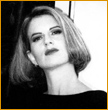|
(R)evolutionary!by Lisa Paul Streitfeld
This
is an excerpt from an informal note Lisa published on her blog/memoir, Critical
Trilogy: A Critic's Millenial Journey, on October 19, 2010. See also her formal
review of Adi Da's art, published on The Huffington Post website, which very nicely
complements this note about how she found Adi Da's art.
About five years ago, I was leaving a Chelsea galley with my friend Peter Frank, when he said: “You have set a difficult task for yourself.” “What is that?” I asked. “To find the spiritual in art,” he replied. Was he joking? I never really know with Peter the wit, the punster. From my 1997 launch as newspaper critic, I managed to interpret from within my own reality structure established through an experiment catalyzed by a Heaven meets Earth planetary configuration which metaphysicians were interpreting as the gateway to the Age of Aquarius. But in the time that has passed since I stopped writing regularly for the public about art, the only passage forward was surrender, as there didn’t seem to be any existing track for my journey to uncover the post-patriarchal archetypes. The New York art world has little concern with spirituality in art. Surviving, never mind triumphing, in New York City requires a great deal of ego. For the last two decades, it was the ambition of pushing the slick and salable object into an insatiable market. Currently, it is illusion of finding the “next great artist” through the competition of a “reality” TV show.
Fortunately, the New York premiere of Adi Da Samraj at Sundaram Tagore Gallery in Chelsea revealed a new modernism — that ironically for a self-declared avatar — resolved the postmodern obstacle of ego. Not only because the artist is dead, but because the fallen guru managed an entire trajectory of death and rebirth the last decade without being tempted by the prospect of fame. The hand that removed itself from the physical manifestation of his vision was also the hand that waved away the vicissitudes of fame and fortune, and the audience expectations that come with such an unholy pursuit. Yet, it turns out that Peter Frank led me onto “Orpheus and Linead,” Adi Da Samraj’s premiere exhibition in Chelsea! It began with an e-mail “By way of Peter Frank” which contained an invitation to a special preview from Mei-Ling Israel, author of The World as Light, a fascinating book about the evolution of the avatar’s vision into the material of his art. The images from the exhibition didn’t initially attract me. They were so blatantly digital with primary color combinations reminiscent of a child’s plastic game. The viewing experience was jarring; how could their source be organic? Yet, I found his videos so compelling that I did some research. After reading much about the avatar Adi Da Samraj, and nothing about his art, I was prepared to dismiss him as yet another of the stream of fallen gurus that have appeared in my path. . . But in an internet search for his astrology chart, I discovered this writing from his appointed astrologer:
This view of patterning fits my experience. I have had my astrology chart read many times, my palms read, my numerology and voice analyzed. My tarot card readings were invaluable aids to my life journey. In revealing the same pattern, these insights were my introduction into magic — the raising of my vibration — as the practice by which I could overcome them. So, I was intrigued and prepared to re-enter Chelsea with an empty mind. I entered the gallery with a single goal — to experience the art of Adi Da Samraj, not as a critic, but as a participant in a subjective search for — well nothing, in particular. How could I resist an artist who claims he has a key to unlock me from my patterns? My visit to the gallery knocked me out. The power of the New bounced right off the smooth surfaces and reverberated deep into my psyche. The tremendous scale, the sleek surfaces that seemed to mock the postmodern with the depth of their meaning. The sacred marriage of opposites on the surface symmetry/irregular geometries of meaning as well as the objective/non-objective merging of abstract and figuration. The newly imbedded archetypes of liberation busting up old patterns. I left feeling incredibly free and optimistic about the future of art. The shock of discovering what I had long given up expecting to find in Chelsea took over a month to sink in. I wasn’t ready to penetrate Mei-Ling’s book or the catalog until September 29, and I didn’t write a review until I returned from the October 9 closing with Peter Frank .
Adi Da’s position on astrology can be found in Chris Tong, Three Views of Reality and Human Potential: Book 8 of The Practical Spirituality Series. |
| Quotations
from and/or photographs of Avatar Adi Da Samraj used by permission of the copyright
owner: © Copyrighted materials used with the permission of The Avataric Samrajya of Adidam Pty Ltd, as trustee for The Avataric Samrajya of Adidam. All rights reserved. None of these materials may be disseminated or otherwise used for any non-personal purpose without the prior agreement of the copyright owner. ADIDAM is a trademark of The Avataric Samrajya of Adidam Pty Ltd, as Trustee for the Avataric Samrajya of Adidam. Technical problems with our site? Let our webmaster know. |
 Lisa
Paul Streitfeld is an art critic, curator, performance artist and novelist
who delivered a paper, "Applying the Heisenberg Uncertainty Principle to 21st
Century Art", at the
Lisa
Paul Streitfeld is an art critic, curator, performance artist and novelist
who delivered a paper, "Applying the Heisenberg Uncertainty Principle to 21st
Century Art", at the 

